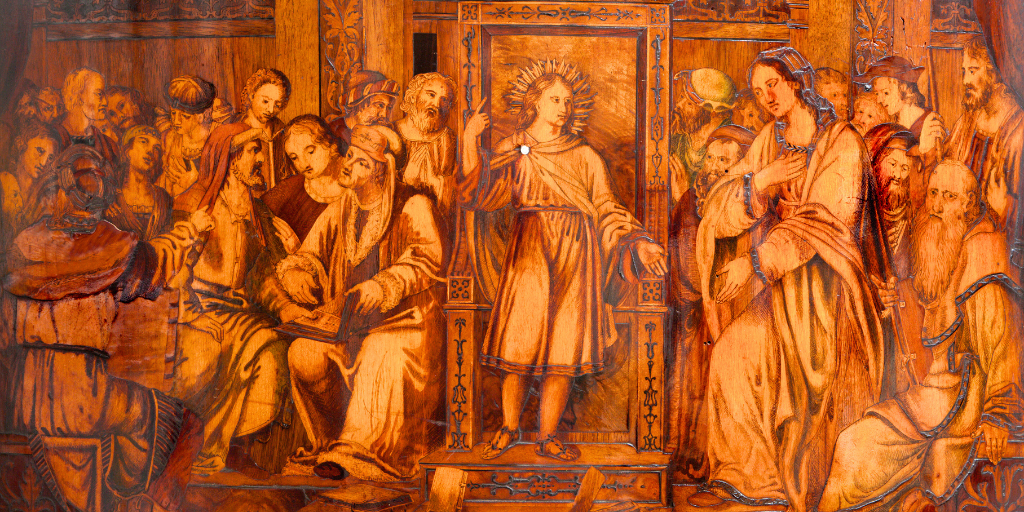
Debra Black reflects upon how the joy of finding Jesus heals any angst we might experience in seeking Him.
Today is the feast of the Exaltation of the Holy Cross, a day in which we celebrate (yes celebrate!) one of the most gruesome means of execution used in its time. It is by the cross that Jesus redeemed the world. We lift up the cross in our heart and deeds. Embracing it, we embrace Him.
As the sun surpasses all the stars in luster, so the sorrows of Mary surpass all the tortures of the martyrs. (St. Basil the Great)
It seems fitting that tomorrow, we honor devotion to the seven sorrows of Mary, given that His Crucifixion was the greatest of her sorrows. Perhaps her earlier sorrows prepared her for this, especially the physical separation prayed in the third sorrow: the “Loss of Jesus in the Temple.” This seems in stark contrast to the fifth joyful mystery of the Rosary which is the finding of 12-year-old Jesus in the Temple! The fruit of this mystery is the joy of finding Jesus. However, in the Scripture passage recounting this event, we hear a lot about His parents' angst from seeking Him. Where is the joy?
Joseph had brought Mary and Jesus with him to perform his temple duty of Passover. This is one of the three main feasts for which men were to return to Jerusalem to celebrate. At its conclusion, the family travels an entire day before realizing Jesus was not with their relatives in the caravan. They returned to Jerusalem (another day’s journey) and then looked for Him in Jerusalem before finding Him in the Temple.
Can you imagine losing your child for several days? Mary responded as any mother would:
When his parents saw him, they were astonished, and his mother said to him, “Son, why have you done this to us? Your father and I have been looking for you with great anxiety.” (Luke 2:48)
Some older Bible translations state, “Your father and I have sought thee sorrowing.” Certainly, it can be seen as a precursor to the sorrow Mary will experience in Jesus’ Passion and death. The esteemed 17th-century spiritual director Rev. Grou explains this event was intended to refine the purity of her love:
But perfect as was that love it stood in need of trial to refine its purity—to render it in a manner divine. It was requisite that she should gradually learn to love him less as her Son than as her God. The tie that bound her to Jesus was at once natural and supernatural; it was needful that she should soar above the claims of nature and cling to him by the spirit alone. (Jesus and Mary, 125)
Similarly, God permits these sorrows in our relationships, both between husband and wife and between parent and child. Our initial love for the other becomes mixed with our fear and wounds along with the purifying ways we behave towards one another. Our love of the other person must rise above sensible attractions so as to spiritualize our affections. To learn to love them as God does, we must allow Him to purify our love.

In our own relationships, too often we dwell on the angst and not the joy. Similarly, the risk in meditating on this passage is remaining focused on the angst. At first, we find comfort in placing ourselves with Mary and Joseph. We can relate to their anxiety and fear in this search for their precious child.
But at some point, we, like they, must give up that angst so we can fully enjoy His presence. Can I take joy in finding Him in my life? In the small blessings of my day which I have overlooked? This is the grace of the present moment, where love abounds.
Finally, it is important to also see this through God’s perspective. Jesus was never lost. Hence our Bibles usually label this section as “The Boy Jesus in the Temple,” not the losing of Jesus nor the finding of Jesus. To be found, one first must be lost—which Jesus was not. Yet from the perspective of Joseph and Mary, He was lost. Jesus shifted their paradigm to understand as God does, and they were “astonished.”
With sincere reflection, we too can recount those perspective-bending situations or conversations when God shifted our paradigm. Our Father desires that, through prayer and examination, we grow to hand our angst over to Him so that He may replace it with His love. Once our eyes of faith are formed in love, our love for others is purified and grows to be like His own.
Ultimately, the joy of finding Jesus will heal any angst we might experience in seeking Him.

Copyright 2023 Debra Black
Images: Canva
About the Author

Debra Black
Debra Black is a spiritual director, perpetual member of the Fellowship of Catholic Scholars, international educator, and businesswoman. Her public service roles have spanned city commissioner, pregnancy clinic board of directors, youth and college ministry, public citizen activism, and homeless street ministry. Her writings can be found at TheFaceOfGraceProject.com, including her latest books, The Life Confession: A Discovery of God’s Mercy and Love and Kick Butt: The Quick Guide to Spiritual Warfare.


.png?width=1806&height=731&name=CatholicMom_hcfm_logo1_pos_871c_2728c%20(002).png)
Comments